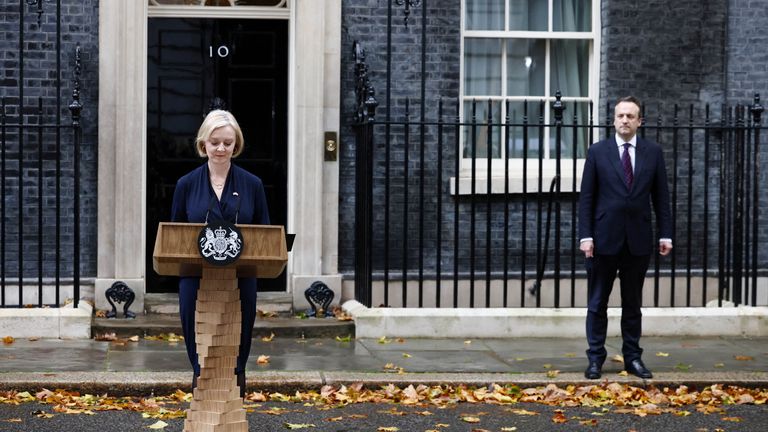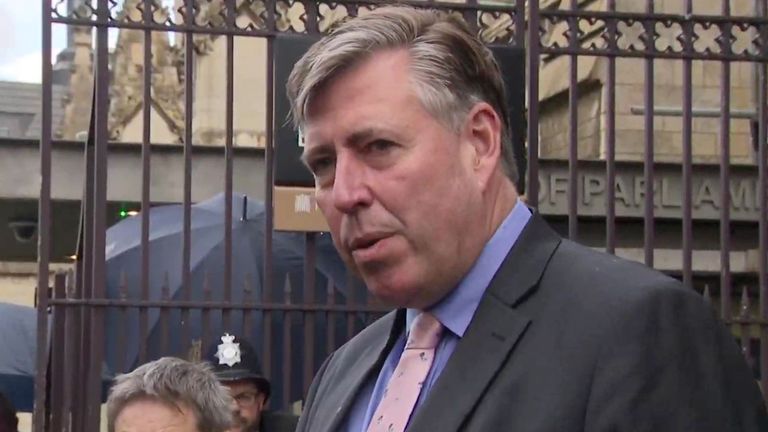Liz Truss resigned as Prime Minister just 44 days after succeeding Boris Johnson.
She will be the prime minister with the shortest tenure in modern British political history.
In a statement read outside Downing Street, Ms Truss said: “I came into office at a time of great economic and international instability.
“Families and businesses were worried about how to pay their bills.”
She said she was elected “with a mandate to change this”, adding: “We delivered on energy bills.”
” I recognise, though, given the situation, I cannot deliver the mandate on which I was elected by the Conservative Party,” she said.
“I have therefore spoken to His Majesty the King to notify him that I am resigning as leader of the Conservative Party.
“This morning, I met the chairman of the 1922 committee, Sir Graham Brady. We’ve agreed that there will be a leadership election to be completed within the next week.”
Ms Truss will remain as PM until her successor has been chosen.
Sir Graham said they expect to conclude a leadership election by Friday 28 October with a new PM in place in time for the 31 October fiscal statement.
He said Tory members are expected to be able to vote but the candidates could be whittled down to just one.
Ms Truss’ resignation came just a little over 24 hours after she told MPs she was a “fighter, not a quitter”.
There has been much speculation about who could replace Ms Truss, with new chancellor Jeremy Hunt one of the main names being suggested.
However, Sky News deputy political editor Sam Coates said he has been told Mr Hunt will not stand.
Other Tory MPs being suggested are Penny Mordaunt, Rishi Sunak, Kemi Badenoch, and even Boris Johnson.
Former leadership candidate Tom Tugendhat has ruled himself out.
He added: “The Tories cannot respond to their latest shambles by yet again simply clicking their fingers and shuffling the people at the top without the consent of the British people.
“They do not have the mandate to put the country through yet another experiment; Britain is not their personal fiefdom to run how they wish.”
The start of Truss’ downfall
Ms Truss’ downfall started when her former chancellor Kwasi Kwarteng announced his mini-budget a month ago, which prompted weeks of economic turmoil and eventually led to him being sacked last Friday.
Mr Hunt, who voted for Rishi Sunak during the leadership campaign, then took over as chancellor and U-turned on the majority of the unfunded mini-budget tax cuts on Monday – further undercutting Ms Truss’ authority.
On Wednesday afternoon, her home secretary, Suella Braverman then quit after saying she had breached security rules by sending a policy message to a colleague over her personal email by mistake.
It only got worse on Wednesday evening after confusion over whether Labour’s opposition day vote was actually a confidence vote in the government or not – which resulted in allegations of “manhandling” of Tory MPs by colleagues.
Some Tory MPs had publicly called for Ms Truss’ resignation before that but in the hours before she quit, a flurry of Tory MPs revealed they wanted her to go.
Conservative Party rules prevent a leader from a confidence vote in the first 12 months of their tenure but it is understood after a significant number of MPs wrote to Sir Graham Brady, chair of the 1922 Committee of backbench Tory MPs, calling for her to go, a decision was made that she could not stay.


